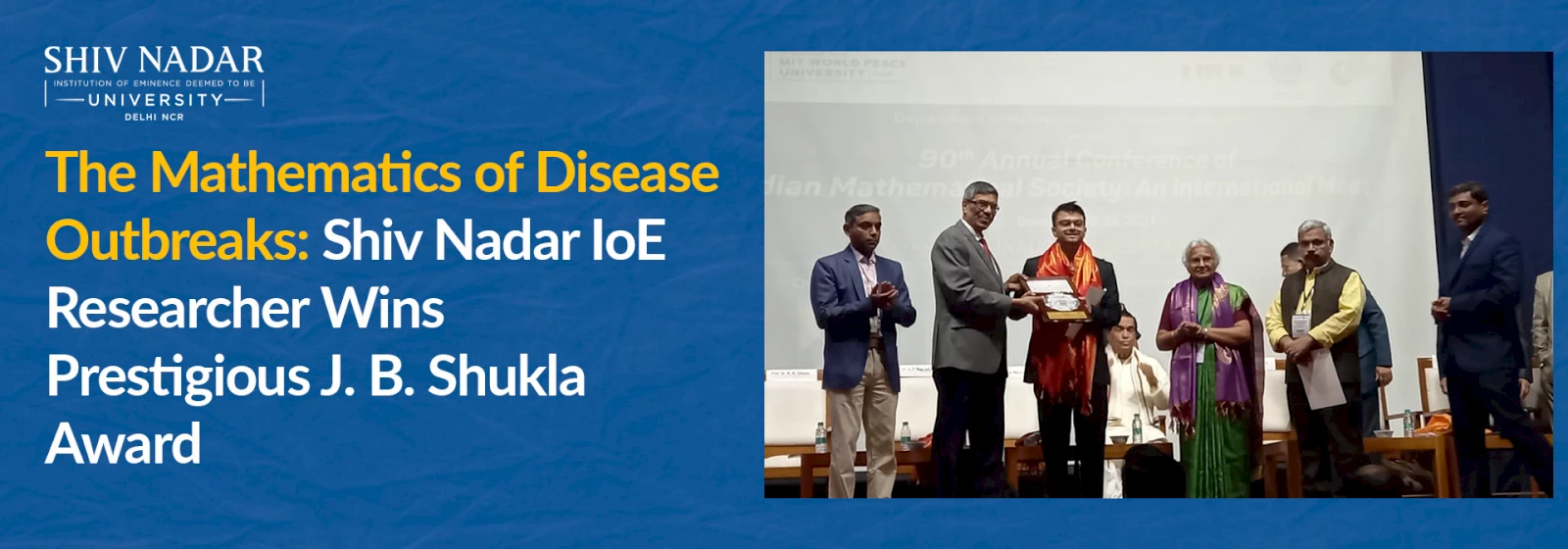The Mathematics of Disease Outbreaks: SNU Researcher Wins Prestigious J. B. Shukla Award
Every year, the Indian Mathematical Society confers the prestigious J. B. Shukla Award to Indian scientists who have significantly contributed to the field of mathematical biology. Named for prominent Indian mathematician Jung Bahadur Shukla, the award recognises the most noteworthy research paper across the fields of bioinformatics, mathematical epidemiology, mathematical ecology, and all others that fall under the broad umbrella of mathematical biology. This year, the award was jointly won by Dr. Samit Bhattacharyya of the Shiv Nadar University and Viney Kumar, one of his Ph.D. students. Their paper, which was published in Chaos, Solitons, & Fractals in October 2023, explains how people’s feelings and social interactions influence their decision to get vaccinated during a disease outbreak.
Dr. Bhattacharyya has been active in the field of infectious disease modelling for nearly 15 years. This is a multidisciplinary field of research that sits at the intersection of science, mathematics, and public health, employing techniques like compartmental epidemiological models to explain disease transmission and game theory, as well as adaptive modelling to incorporate human behaviours. These models allow researchers to understand key factors such as how quickly a disease may spread, which groups are most at risk, and how behaviours like social distancing, vaccination, or masking influence outcomes.
The study of human behaviour in infectious disease modelling adds a critical layer of complexity to understanding and managing disease outbreaks. While the biology of pathogens is important, it is human behaviour—how people interact, perceive risks, and respond to interventions—that often determines the success or failure of public health strategies. Dr. Bhattacharyya’s research in this field has helped unravel a number of critical issues in public health, such as the global antibiotic resistance crisis and how it is impacted by self-medication behaviours and mosquito net usage in Sub-Saharan Africa and its influence on malaria outbreaks.
One of the focal points of Dr. Bhattacharyya’s research in recent years has been the role of social media during disease outbreaks. Platforms like Facebook, Twitter, and Instagram can rapidly disseminate news, opinions, and personal stories, significantly influencing public perception and behaviour during an outbreak. His work explores questions like how quickly information spreads online compared to the disease itself, whether the messages shared are beneficial or harmful, and how people modify their behaviour based on what they encounter on these platforms—such as whether to get vaccinated or adhere to health guidelines.
In the article, Dr. Bhattacharyya and Viney Kumar untangle the factors influencing an individual’s choice to get vaccinated, which is one of the primary means of curtailing a disease outbreak. Using a multi-faceted network model that integrates several different areas of interaction (e.g., home, online, and work), they describe how social influence has a powerful effect on vaccination decisions. Positive opinions from friends, family, and social media engender a positive opinion on vaccination, and vice versa. “Our paper also highlights that small changes—like a single influential post on social media or news about a vaccine side effect—can create big shifts in how a community feels about vaccines,” adds Dr. Bhattacharyya. Another key finding of their paper is that a person’s fear or confidence in a vaccine can spread to those around them like a ripple effect.
Understanding these patterns can help public health organisations better combat misinformation and deliver more effective health campaigns. “Timely and transparent communication, collaborations with trusted influencers, and positive social media campaigns combined with targeted interventions that address specific community concerns can help shift public attitudes,” underscores Dr. Bhattacharyya.
Currently, Dr. Bhattacharyya’s research is based out of the Disease Modelling Lab at SNU, which is unique in the Indian research ecosystem because of its focus on human behaviours in the study of epidemiology. The team at the lab is also exploring the impact of social stigma on the spread of diseases, using tuberculosis as a starting point.
By bridging mathematics, epidemiology, and public health, Dr. Bhattacharyya’s research continues to offer valuable insights into how human behaviour is factored into infectious disease research, helping shape more effective responses to global health challenges.
